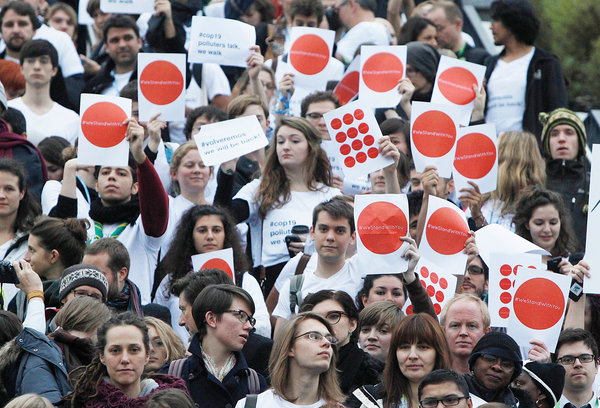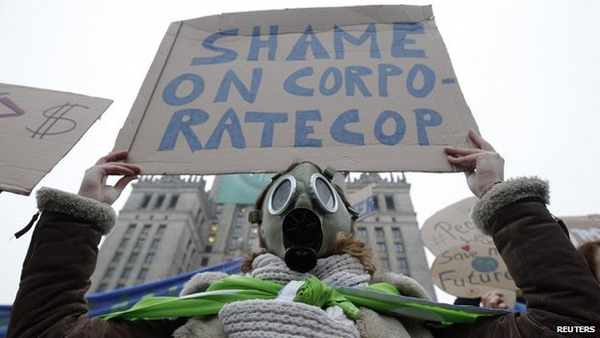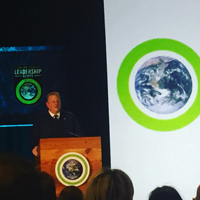
The United Nations Climate Change Conference in Warsaw, Poland, was already dealing with complications from the very beginning, but yesterday, November 21, 2013, a walk-out of some 800 people, mostly young, from organizations such as 350.org, Greenpeace, WWF, Oxfam, Friends of the Earth, and others, left the conference in an act of protest wearing T-shirts that read “Volveremos” (we will return) due to the lack of action taking place.
Just as many so-called sustainability conferences have been hijacked by the fossil fuel industries and corporations most at odds with changes in effecting global warming, so too has the UN Climate Change Conference in Poland—mostly by fossil fuel lobbyists.
As Hoda Baraka, Global Communications Coordinator of 350.org described in a telling interview on COP19 yesterday, the fact that it’s fossil fuel companies that are at the root of sponsorship of the conference itself in Poland, is a huge disconnect with the very reason for having the summit to begin with. In addition, it was made obvious that although this summit was to begin the process of roadmapping a new agreement on climate change issues (to be pursued in Lima in 2014 and a final deal completed in Paris in 2015), talks narrowed down to political lobbying groups from the fossil fuel industries intent on political negotiations and rich countries in particular, arguing over compensation.
The reason for the walk-out, according to a WWF spokesman is that “Movements representing people from every corner of the Earth have decided that the best use of our time is to voluntarily withdraw from the Warsaw climate talks. This will be the first time ever that there has been a mass withdrawal from a COP.”
“Warsaw, which should have been an important step in the just transition to a sustainable future, is on track to deliver virtually nothing. We feel that governments have given up on the process,” he said.

Other problems with the talks stem from many countries not upholding their end of the climate change bargain in terms of cutting emissions, and the on-going dilemma of what to do about developing countries which are quickly adding to the massive problem already started by the richest countries.
Kumi Naidoo, director of Greenpeace International explained, “The Polish government has done its best to turn these talks into a showcase for the coal industry. Along with backsliding by Japan, Australia and Canada, and the lack of meaningful leadership from other countries, governments here have delivered a slap in the face to those suffering as a result of dangerous climate change.”
According to Winnie Byanyima, director of Oxfam International, “We are walking out of these talks because governments need to know that enough is enough. People around the globe have a right to know about the desperate state of these negotiations. The stakes are too high to allow governments to make a mockery of these talks.”
In many ways, the act to NOT participate shows how ridiculous the situation has become in Warsaw and the United Nations on climate change. There are parallels here to what Russell Brand expounded on in an interview October 23, 2013, with Jeremy Paxman on BBC’s Newsnight about why not voting is an act of rebelling against a political system(s) that has proven itself over and over as ineffective.
At Label Networks, one of the most important youth culture studies we’ve done, Sustainability and the State of the Future Youth Culture Study, has to do with youth ages 13-25-years-old and their opinions and actions when it comes to climate change, global warming, sustainability issues, and fossil fuels. Their changes in spending habits and actions are already affecting the way brands need to do business—from fashion to footwear, sports to technology–and yet it’s scarcely on the radar of even the most leading-edge youth culture brands and agencies.
While the leaders charging for change is among the youth marketplace, they are very often the least understood. The latest walk-out in Poland is another wake-up call that industries need to realize that we’ve entered into a new world order. One that does not see “profits” in terms of monetary revenue but profits in terms of how cultural events and in particular, tackling the issues of global warming, effect their lifestyle, a new economy, sense of happiness, success, and the planet.
For a generation that has grown-up with recycling and the knowledge of finite resources of fossil fuels, it’s a very different market reality. The fossil fuel industry is not sustainable (and young people know this) and the longer it takes industries and countries to invest in new forms of renewable energy, the greater the disconnect with an entirely fresh group of up-and-coming leaders.
Just as brands can have near-irreversible brand backlash from a greenwashing marketing or advertising campaign among a tech-savvy youth demographic, so too can an entire country. We can guarantee that Poland just marched into an enormous international backlash with ripple effects among global youth culture markets that they cannot even imagine in the future.
The disconnect is even more apparent when you consider that the nation’s Ministry of Economy hosted a coal summit for coal industry leaders at the same time as the UN Climate Change Conference. The timing couldn’t have been worse.
Obviously it’s a huge topic in Poland, a country whereby 80% of their electricity comes from coal. Poland is one of the most coal-dependent countries in Europe. Unfortunately, while many leaders think that moving away from coal means stifling economic growth, economists have proven that this can be just the opposite. In addition, the majority of the country’s citizens are actually pro-renewables.
According to a recent National Geographic article, 89% of Polish citizens are actually in favor of getting off coal and searching for renewable energy sources, according to a survey by Greenpeace. In a report by Bankwatch, by living and breathing in Krakow for one year, a resident inhales as much benzopyrene, a highly carcinogenic pollutant, as he or she would from smoking 2,500 cigarettes.
In a highly charged speech at the coal summit, Christiana Figueres, executive secretary of the UNFCCC, told the industry that they “must change rapidly and dramatically for everyone’s sake” and that they must “leave most existing coal reserves in the ground.”
“Coal has undoubtedly enabled much of our progress over the last 200 years,” she said. But “we now know there is an unacceptably high cost to human and environmental health.”
“We must urgently take steps that look past next quarter’s bottom line,” said Figueres, “and see the next generation’s bottom line, and figure health, security, and sustainability into the bottom line.”
Youth culture leaders in sustainability are already doing this. Brands, industries, and countries that don’t step-up and move in this direction are already way behind. And the brand backlash will mean more than a generation not liking your brand or product or country, but a brutal apocalyptic reality for the planet.
For more information about sustainability strategies, the Sustainability and the State of the Future Youth Culture Study, or presentations, contact info@labelnetworks.com; (323) 630-4000.
Check-out the interview with Hoda Baraka, Global Communications Coordinator of 350.org.


